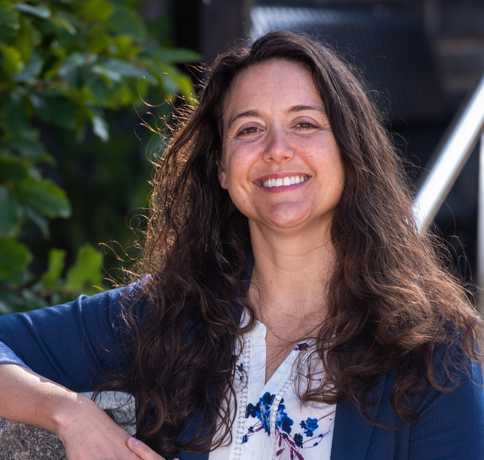"Tissue-Inspired Synthetic Biomaterials:
Applications in Cancer and Traumatic Brain Injury"

Speaker: Dr. Shelly Peyton,
Professor and Department Chair, Biomedical Engineering, Tufts University
Day and Date: Friday, August 30th, 2024
Time: 10:45-11:45AM
Location: HST 101
Abstract:
Most environments available to study how human cells behave are two-dimensional (2D). In real tissue, cells live surrounded by a three-dimensional (3D) extracellular matrix (ECM), which provides structure, drives cell function, and is dynamically remodeled by the cells within. A major limitation of the few examples of 3D cell culture environments that do exist (typically made from assemblages of proteins) is that their constituents are undefined, and they have unacceptable batch-to-batch variability. On the other end of the spectrum, the major drawbacks to using engineered, synthetic environments is their over-simplicity and lack of resemblance to real tissue. My lab’s unique approach to biomaterial design is that we create cheap and easy-to-use, yet complex representations of the ECM of specific tissues. My lab’s tissue-customized environments are hydrogels from synthetic polymers that replicate a tissue’s 3D geometry, the stiffness of that tissue, and all the integrin-binding and protease-degradable components of the ECM of the tissue of interest. We made biomaterial designs for brain, bone marrow, omentum, and lung, and we have applied our approach to several complex problems in biology (e.g., astrocyte reactivity, mesenchymal stem cell differentiation, ovarian cancer, etc.).
In this seminar, I’ll discuss how we use our engineering principles to create these environments and show how we’ve begun to use them to study grand challenges in cancer biology and traumatic brain injury. One of the overwhelming challenges in treating metastatic cancer is that tumors in the brain, lung, skeleton, and liver are typically drug resistant, and we do not have a good understanding of why these tumors evade therapy. The biomaterials we have built over the years are well suited for drug screening applications and to study how the extracellular microenvironment regulates the metastatic spread of cancer. I’ll discuss how some of these same materials design strategies can be used to study astrocytes – a brain-specific cell type that can toggle between quiescent and activated states during traumatic brain injury.
Personal Bio:
Shelly Peyton Professor and Department Chair of Biomedical Engineering at Tufts University. She received her B.S. in Chemical Engineering from Northwestern University in 2002 and went on to obtain her MS and PhD in Chemical Engineering from the University of California, Irvine in 2007. She was then an NIH Kirschstein post-doctoral fellow in the Biological Engineering department at MIT before starting her academic appointment at the University of Massachusetts Amherst in 2011, before moving to Tufts University in 2024. Shelly leads an interdisciplinary group of engineers and molecular cell biologists seeking to create and apply novel biomaterials platforms toward new solutions to grand challenges in human health. Her lab’s unique approach is using our engineering expertise to build simplified models of human tissue with synthetic biomaterials.
They use these systems to understand:
- The physical relationship between metastatic breast cancer cells and the tissues to which they spread
- The role of the extracellular matrix and its dynamics in drug resistance
- How to create bioinspired, mechanically dynamic and activatable biomaterials.
Among other honors for her work, Shelly was a 2013 Pew Biomedical Scholar, received a New Innovator Award from the NIH, and she was awarded a CAREER grant from the NSF. Shelly is a fellow of the Biomedical Engineering Society and a fellow of the American Institute for Medical and Biological Engineering. Shelly is passionate about graduate student training and diversifying the academy. She was awarded an Outstanding Teaching Award from the College of Engineering at UMass in 2018, has led an REU Site, co-directed a Biotechnology (BTP) NIH T32 training program, and was lead PI of a PREP program at UMass, which hosts students from historically excluded groups for a 1-year research-intensive program to help prepare them for graduate school. She also runs an NSF-funded program called Engineering the Cell, which brings female high school students to her lab for 5 weeks every summer.
Outside of her work, Shelly is an avid cyclist, enjoys board games, travel, and is a retired ultimate frisbee player.
This event is free and open to the public. Please reach out to the Department of Bioengineering's team (inbioe@lehigh.edu) with any questions or comments.
